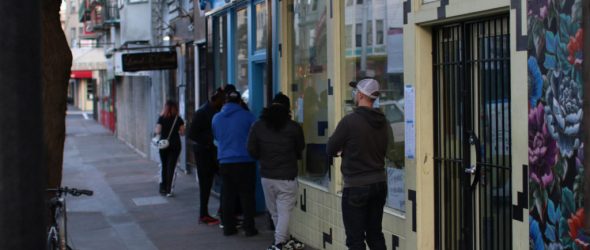 https://cannabisexaminers.com/wp-content/uploads/2020/09/22657679_web1_200909-sfe-dispensary_1-1024x683.jpg
https://cannabisexaminers.com/wp-content/uploads/2020/09/22657679_web1_200909-sfe-dispensary_1-1024x683.jpg
A voter-approved tax on cannabis sales in San Francisco is set to go into effect next year, but one supervisor has proposed giving the industry a break.
Supervisor Rafael Mandelman introduced legislation last week that would postpone imposing The City’s cannabis tax until after the 2021 tax year.
“Now is no time to be imposing a new tax on small businesses,” Mandelman said in a statement to the San Francisco Examiner. “By deferring the Cannabis Business Tax by one year, we can help stabilize these businesses and provide time for the State to adjust its tax structure and for the Biden Administration (we hope) to update Federal policies.”
Mandelman also noted that “cannabis businesses have also faced significant costs and barriers to opening in San Francisco, with many paying rent on empty storefronts for years while they wait for permits.”
“It’s really a matter of survival,” said John Delaplane, president of the San Francisco Cannabis Retailers Alliance and a partner in two dispensaries.
Delaplane, who is supporting the proposal, said that since dispensaries are considered essential businesses and allowed to operate, they actually have largely recovered from the financial impacts of COVID-19.
But they face financial challenges from high state taxes and the inability to write off business expenses, he said.
Under the federal Internal Revenue Code Section 280E, businesses that deal with schedule one substances — marijuana remains in this category — are prohibited from receiving a tax dedication for basic expenses as other businesses do, including rent, payroll and marketing.
Add the local tax, which is set to go into effect on Jan. 1, 2021, and Delaplane said dispensaries could actually end up in the red.
Delaplane, who opposed the tax measure in 2018, said that his group is actually pushing City Hall to permanently lower the tax, not just defer it for one year, but called Mandelman’s proposal a “compromise.”
“If that tax went into effect, a modest store that’s doing almost $2.5 million, $3 million in revenue, this tax would put them in the red. It would actually put them at a loss,” Delaplane said, pointing to financial models he had done. “In order to break even on this tax, you have to do at least $7 million in revenue.”
Delaplane acknowledged that retailers could always pass on the cost to consumers, but said the higher costs could fuel the black-market or open the door for larger enterprises.
“If you’re a single one-off dispensary, this kills you,” Delaplane said of the tax.
Mandelman agreed that high costs are hurting efforts to regulate the industry.
“Cannabis businesses in particular face high taxes from the State and hostile Federal tax policies, leading to increased prices for legal retail sales that have fueled the illicit market,” Mandelman said.
In November 2018, 65 percent of the voters passed Proposition D, an “Additional Tax on Cannabis Businesses,” that would impose a gross receipts tax on the industry beginning Jan. 1, 2021.
But the measure allowed the board to make changes as it sees fit.
The tax, which ranges from 1 percent to 5 percent, depending on business type and total tales, is expected to generate $4.3 million in fiscal year 2020-21 and $8.5 million in fiscal year 2021-22, according to the Aug. 11 City Controller revenue letter.
“I look forward to working with my colleagues on the Board, the Mayor’s Office, the Office of Cannabis, the Controller and the cannabis industry on this legislation over the coming months,” Mandelman said.
His proposal also makes other adjustments to the tax for when it would go into effect in 2022.
The tax currently wouldn’t apply to a business’s first $500,000 in gross revenues. Mandelman’s proposal increases the exemption to $1 million. He also adds another $500,000 of what would be taxed under a lower rate before a higher rate kicks in.
For example, currently retailers of cannabis would be taxed 2.5 percent of gross receipts up to $1 million and 5 percent of gross receipts in excess of $1 million. The proposal says the 2.5 percent rent would apply to $1.5 million in gross receipts and the 5 percent rate to what’s above $1.5 million.
‘It’s helpful,” Delaplane said of the tweaks. “It’s not exactly where we want it, but it’s helpful.”
There are currently 80 permitted cannabis retailers in San Francisco, according to the Office of Cannabis website, half of which are storefronts and half of which are delivery services. It’s not clear how many are in operation.
The legislation would require at least six votes by the board to pass.
jsabatini@sfexaminer.com
Bay Area NewscannabisCoronavirusPoliticssan francisco news
Find out more at www.sfexaminer.com/join/

